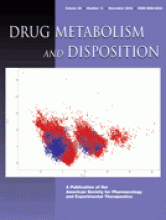Abstract
Seliciclib, a cyclin-dependent kinase inhibitor, is a promising candidate to treat a variety of cancers. Pharmacokinetic studies have shown high oral bioavailability but limited brain exposure to the drug. This study shows that seliciclib is a high-affinity substrate of ATP-binding cassette B1 (ABCB1) because it activates the ATPase activity of the transporter with an EC50 of 4.2 μM and shows vectorial transport in MDCKII-MDR1 cells, yielding an efflux ratio of 8. This interaction may be behind the drug's limited penetration of the blood-brain barrier. ABCB1 overexpression, on the other hand, does not confer resistance to the drug in the models tested. These findings should be considered when treatment strategies using seliciclib are designed.
Footnotes
The work was supported by Hungarian National Office for Research and Technology [Grant XTTPSRT1]; and the European Community [Grants LSHB-CT-2004-005137, LSHB-CT-2006-037499, LSHB-CT-2006-518246, LSHGCT-2006-037543, LSSG-CT-2006-037654]. A.O. was a recipient of a postdoctoral fellowship from the Scientific and Technological Research Council of Turkey.
Article, publication date, and citation information can be found at http://dmd.aspetjournals.org.
doi:10.1124/dmd.110.032805.
-
ABBREVIATIONS:
- CDK
- cyclin-dependent kinase
- ABC
- ATP-binding cassette transporter
- MDR
- multidrug resistance protein
- LY335979
- [(2R)-anti-5-{3-[4-(10,11-difluoromethanodibenzo-suber-5-yl)piperazin-1-yl]-2-hydroxypropoxy}quinoline
- NMQ
- N-methylquinidine
- calcein AM
- calcein acetoxymethylester
- MDCKII
- Madin-Darby canine kidney strain II
- BCRP
- breast cancer resistance protein
- HRP
- horseradish peroxidase
- Papp
- apparent permeability coefficient
- MDCKII-MDR1
- Madin-Darby canine kidney strain II-multidrug resistance protein 1
- PLB985-BCRP
- The human myelomonoblastic leukemia cell line-breast cancer resistance protein.
- Received February 16, 2010.
- Accepted August 10, 2010.
- Copyright © 2010 by The American Society for Pharmacology and Experimental Therapeutics
DMD articles become freely available 12 months after publication, and remain freely available for 5 years.Non-open access articles that fall outside this five year window are available only to institutional subscribers and current ASPET members, or through the article purchase feature at the bottom of the page.
|






